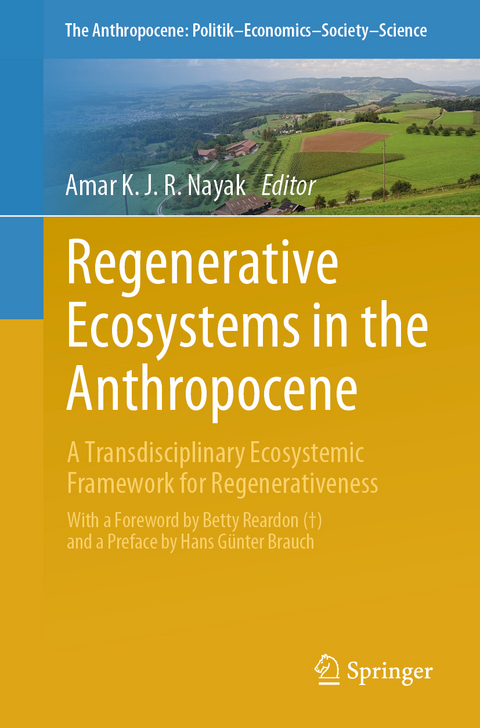
Regenerative Ecosystems in the Anthropocene
Springer International Publishing (Verlag)
978-3-031-53297-9 (ISBN)
The book offers a transdisciplinary eco-systemic framework for analysis of ecosystems. It uses eight dimensions (economic-social-political-environmen-tal) and 40 factors to diagnose degenerating ecosystems and to synthesize regenerative ecosystems amid growing uncertainty, and inequality in the Anthropocene.
Chapter 1 broadly defines the `all interacting evolving systems science' (AIESS) approach in terms of its eco-systemic and transdisciplinary action research methodology. Chapter 2 provides a detailed explanation of the AIESS approach through the four concepts of interconnectedness, interdependence, interactions, and intent to diagnose degeneration and synthesize regenerative systems.
Part 1 of the book discusses the issues and approaches to Regenerativeness. Part 2, 3, 4, and 5 illustrate cases of regenerative systems in different ecosystems viz. natural, rural-indigenous, urban, and industrial ecosystems.
Not only the researchers and scholarsin systems science, systems dynamics, systems design, and sustainable transition strategies but also the policy makers, corporate leaders, and development experts will greatly benefit from this book.
1.Presents a ground breaking explanation of the science of change in the Anthropocene and in epochs prior to it through its all interacting evolving systems science framework.
2. Provides a unique transdisciplinary eco-systemic framework as a methodology to diagnose the complex degenerating ecosystems and to synthesize regenerative ecosystems in different geographies of the world.
3. Through various cases from different ecosystems viz., natural ecosystems, rural-indigenous ecosystems, urban ecosystems, and industrial ecosystems, the book presents the challenges as well as the steps and processes to synthesize regenerative ecosystems.
Amar KJR Nayak, Professor & Chairperson, AIESS Research Center, Xavier Institute of Management, XIM University, Bhubaneswar, India.
1. Introduction to AIESS (Eco-systemic) Approach to Knowing and Doing for Regenerative Ecosystems.- 2.All Interacting Evolving Systems Science (AIESS): A Framework to Diagnose Degenerative Ecosystems and Synthesize Regenerative Ecosystems.- 3.Regenerative Sustainability: Homo Ecologicus and The New Enlightenment.- 4. Vedic Philosophical Basis for Regenerative Ecosystems.- 5. Building Regenerative Community Learning Networks.- 6. Applying the Integrative Justice Model as a Normative Framework for Regenerative Business Education Ecosystem.- 7. Competition, Globalization and International Co-operation - Consequences for an Ecological Management.- 8. Flowering Plants Diversity in The Southern End of The Western Ghats.- 9. Reversing the Degeneration of an Ecological Hotspot Through an Ecosystemic Approach: The Case of Chilika Lak.- 10. Bottom-up Eco-systemic Approach to Regenerative Rural Ecosystems in India.- 11. Deconstructing the Understanding of Sustainability for Private-led-Mini-grid Governance - A Case Study of Nigeria.- 12. Enabling Ecosystem for Institutions of Poor and Women Towards Resilience and Growth: The Case of Deendayal Antyodaya Yojna - National Rural Livelihoods Mission (DAY-NRLM).- 13. Seeking an Ecosystems Approach for Soil Regeneration: Efforts Towards Sustainable Agriculture in Tribal Hinterlands.- 14. Impact Pathway for Local Seed Systems adapting to 'People-Led Development' process in dryland areas of Odisha, India.- 15. WADI intervention of NABARD as a Regenerative Ecosystem - A Case Study at Korba, Chattisgarh, India.- 16.Water Hyacinth and Wellbeing of Rural Women in Kerala: A Study of Gender - Nature from Regenerative Ecosystem Perspective .- 17. Development of a Model Village and Making this as a Learning Centre for Other Villages: The Case of Panchayat Academy.- 18. The Contribution of Urban Environmental Organizations in Urban Governance: A Review of the Nigerian Situation.- 19. Holistic Approach in Health Care - Systems Perspective in Implementation of Trauma Care at CMC, Vellore, Tamil Nadu, Indi.- 20.- Regenerative Ecosystem for Sustainable Livelihood: A Study on Tribal Women Street Vendors in Dimapur, Nagaland.- 21.Making the Case for a Regenerative Technosphere.- 22. Relationship between Flexibility of Technology, Growth Strategy and Sustainable Performance of Firms in the Indian Iron and Steel Industry.- 23. Adoption of regenerative industrial ecosystem within the ambit of environmental acts and laws in India.- 24. Synthetic Dyeing versus Natural Dyeing in India: A.- 25 Life Cycle Costing Approach to Assess Regenerativeness.
| Erscheinungsdatum | 27.07.2024 |
|---|---|
| Reihe/Serie | The Anthropocene: Politik—Economics—Society—Science |
| Zusatzinfo | XXXVII, 480 p. 67 illus., 51 illus. in color. |
| Verlagsort | Cham |
| Sprache | englisch |
| Maße | 155 x 235 mm |
| Themenwelt | Mathematik / Informatik ► Informatik ► Theorie / Studium |
| Mathematik / Informatik ► Mathematik | |
| Schlagworte | Eco-systemic Methodology • Interacting Evolving Systems • Multi-disciplinary Systems Methodology • Regenerative Ecosystems • Regenerative Industrial Ecosystems • Regenerative Natural Ecosystems • Regenerative Rural Ecosystems • Regenerative Urban Ecosystems • Systems Design • systems science |
| ISBN-10 | 3-031-53297-X / 303153297X |
| ISBN-13 | 978-3-031-53297-9 / 9783031532979 |
| Zustand | Neuware |
| Haben Sie eine Frage zum Produkt? |
aus dem Bereich


